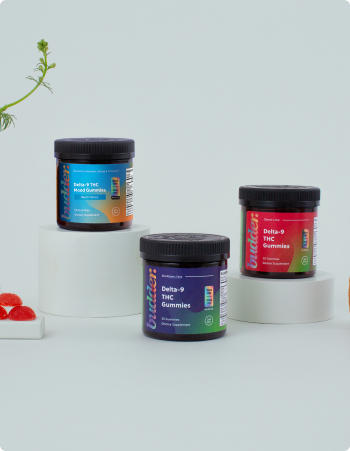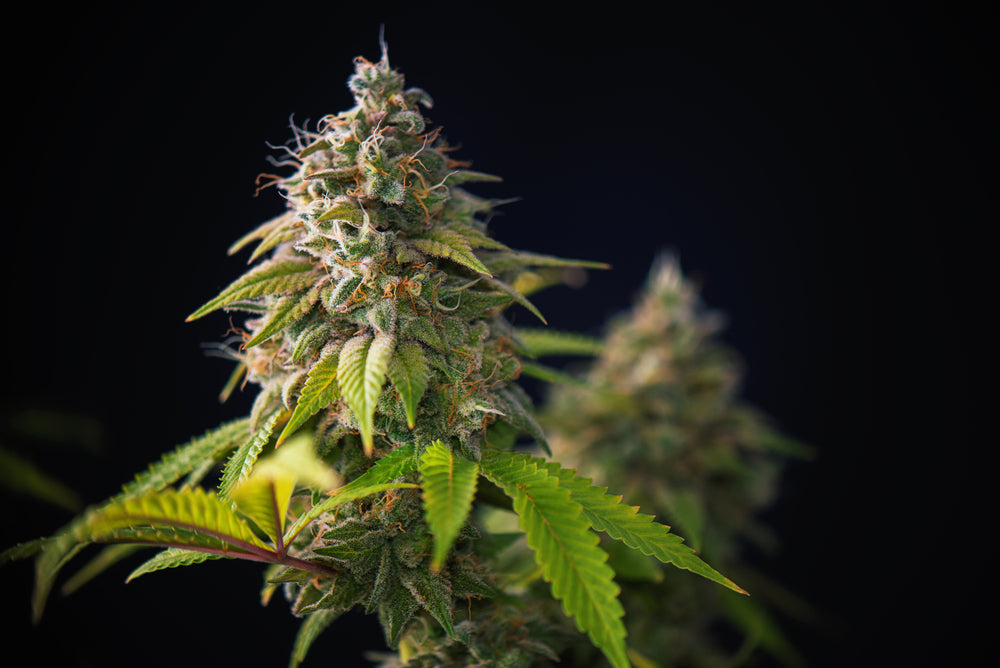Do you find you’re consuming more Delta 8 THC than usual? There's a term that can make even the most experienced users take notice: tolerance. It's our body's way of adapting to substances, but it can also mean diminished effects over time. And when it comes to Delta 8 products like flavored gummies, developing a high tolerance can be a bummer. Picture needing greater amounts just to feel the same buzz. But fear not! We're diving headfirst into Delta 8 THC tolerance. We'll explore how it can impact your usage and tips to help decide if you need a tolerance break.
What Is THC Tolerance?
THC tolerance is a phenomenon that occurs when the body becomes less responsive to the effects of tetrahydrocannabinol (THC). THC is the primary psychoactive compound found in cannabis.
It is important to note that THC is just one of many cannabinoids present in cannabis, and it is responsible for inducing the euphoric and mind-altering effects commonly associated with marijuana use.
When THC enters the body, it interacts with receptors in the endocannabinoid system, which is a complex network of receptors and neurotransmitters located throughout the brain and body. The main cannabinoid receptor that is involved in the psychoactive effects of THC is cannabinoid receptor 1 (CB1 receptor).
This cannabinoid receptor is commonly found in the brain and central nervous system. That's why users get an almost instantaneous high after they've vaped or smoked cannabis flowers from marijuana.
With repeated exposure to THC, the CB1 receptors can become less sensitive and more resistant to the effects of THC. This happens through a process called downregulation, where the number of available cannabinoid receptors decreases or their functionality is reduced.
As a result, increased servings of THC may be required to achieve the same level of intoxication or wellness effects that were initially experienced with lower servings.
In addition to the downregulation of cannabinoid receptors, other factors can contribute to the development of THC tolerance. One of these factors is the body's ability to metabolize THC more efficiently over time.
This means that the body breaks down THC faster, leading to a shorter duration of its effects. The liver plays a significant role in metabolizing THC by converting it into various metabolites that are eventually eliminated from the body.
Furthermore, some evidence suggests that individual differences in metabolism, genetics, and lifestyle factors can also influence THC tolerance. Some people may naturally have a higher tolerance to THC due to their genetic makeup, while others may develop tolerance more quickly based on their frequency and quantity of cannabis use.
It is worth mentioning that THC tolerance is reversible, and taking a break from cannabis use can help reset the body's response to THC. This period of abstinence allows CB1 receptors to upregulate and regain their sensitivity to THC. However, the time required for cannabis tolerance to diminish varies from person to person and depends on various factors.
What Is Delta 8 THC Tolerance?
Delta 8 THC tolerance refers to the body's reduced sensitivity to the effects of Delta 8 tetrahydrocannabinol (Delta 8 THC), a cannabinoid found in cannabis. It is important to note that Delta 8 THC is distinct from Delta 9 tetrahydrocannabinol (Delta 9 THC), which is the more well-known psychoactive compound in cannabis. While both compounds share similarities, they have different chemical structures and produce different effects.
Delta 8 THC tolerance develops when the body's endocannabinoid receptors, specifically the CB1 receptors, become less responsive to the compound. This can occur through downregulation.
Like with tolerance to Delta 9, factors such as frequency and quantity of use, individual metabolism, and genetic factors can influence the development of Delta 8 THC tolerance. Some people may naturally have a higher tolerance to Delta 8 THC, while others may develop tolerance more quickly based on their usage habits.
Taking tolerance breaks, or t-breaks, from cannabis use can help reset the body's tolerance and allow the endocannabinoid receptors to regain their sensitivity.
The duration of a tolerance break varies depending on the individual and their tolerance level, but recommendations for tolerance breaks typically range from 10 days to a few weeks.
It is worth noting that while information from early studies and clinical studies on Delta 8 THC tolerance is available, further research is needed to fully understand its effects.
Delta 8 vs. Delta 9: What to Know
Delta 9 and Delta 8 THC are two different forms of tetrahydrocannabinol, which is the primary psychoactive compound found in cannabis. Here are the differences between Delta 9 and Delta 8 THC.
Chemical Structures
Delta 8 and Delta 9 have a similar structure on a molecular level. However, there is a slight difference that makes a world of differences when it comes to their effects.
Delta 9 has a double bond on the ninth carbon atom, while Delta 8 THC has a double bond on the eighth carbon atom. This slight difference in chemical structure leads to variations in their effects, including how they interact with and bind to CB1 receptors.
Due to its longer chain, Delta 9 promotes stronger effects that tend to last longer than those of Delta 8.
Effects
Delta 9 THC in marijuana is known for its potent psychoactive effects, including intoxication, euphoria, and mind-altering experiences. It is the most abundant psychoactive molecule in cannabis and has been extensively studied for its physiological effects and potential wellness benefits.
On the other hand, Delta 8 THC is far less studied. Most information on Delta 8 is from limited studies and first-hand experiences of users.
It’s been reported that Delta 8 is less psychoactive than Delta 9. Users often describe it as providing a smoother and milder high with reduced stress and paranoia compared to Delta 9. However, due to limited research, the full extent of Delta 8 THC's effects is not well understood.
Natural Occurrence
Delta 9 THC is naturally present in higher concentrations in the cannabis plant, making it the most well-studied form of THC. It is produced by enzymatic reactions within the plant during growth and development.
In contrast, Delta 8 occurs in lower quantities naturally and is considered a minor cannabinoid. Its presence is believed to result from the oxidation of Delta 9 over time. The limited abundance of Delta 8 THC in cannabis contributes to its mild effects.
Manufacturing Process
Delta 8 THC can also be synthesized from CBD (cannabidiol) through a chemical process called isomerization. This process involves converting CBD into Delta 8 THC using various methods, such as acidic conditions or catalysts.
However, there are concerns surrounding the manufacturing process of Delta 8 THC. The use of certain chemicals and solvents in the synthesis process may raise safety and quality control issues. It is essential to obtain Delta 8 THC products from reputable sources that adhere to strict manufacturing standards, including third-party lab testing.
THC Tolerance and Concerns
High tolerance to Delta 9 is often associated with heavy and prolonged marijuana use. The risks and potential side effects of this cannabinoid have been extensively studied, including its impact on cognitive function, mental health, drug abuse potential, and other potential adverse effects.
In comparison, due to the limited research on Delta 8, the long-term effects and risks associated with high tolerance to this cannabinoid are not well understood. It is important to approach Delta 8 THC use with caution and moderation until more research is conducted to fully understand its potential risks and benefits.
What Causes High Delta 8 THC Tolerance?
While there is limited scientific research specifically focused on the causes of high Delta 8 THC tolerance, some factors may contribute to its development. Here are a few possible causes:
Regular and Prolonged Use
Frequent and prolonged use of Delta 8 products can lead to the development of tolerance over time. The body's endocannabinoid system adjusts to the presence of Delta 8 THC, requiring larger servings to achieve the desired effects.
Cross-Tolerance with Other Cannabinoids
Delta 9 and Delta 8 THC are both forms of tetrahydrocannabinol, and they may share some cannabinoid cross-tolerance. This means that regular use of one type of THC can potentially contribute to the development of tolerance to the other.
When a person regularly consumes a specific cannabinoid, their body and brain gradually adapt to its effects. In cannabis, there are over 100 different cannabinoids in varying amounts within the strain. If you are regularly consuming products that have a broad or full spectrum of cannabinoids, you may also create a tolerance buildup to additional cannabinoids besides Delta 8.
Genetic Factors
Individual genetic variations may play a role in how quickly a person develops an increased tolerance. Some individuals may naturally have a higher tolerance or be more prone to developing increased tolerance much faster than others.
How It Was Consumed
The method of consumption can also impact tolerance development. For example, frequent use of high-potency concentrates or vaping may contribute to the development of tolerance more quickly than consuming lower-potency edibles or tinctures.
It's vital to remember that these findings suggest these are potential causes based on anecdotal evidence and early studies.
What Are Signs of High Delta 8 Tolerance?
Tolerance refers to the body's ability to adapt to the effects of a substance, including Delta 8 and additional cannabinoids. Signs of high tolerance can vary from person to person, but there are some common indicators to look out for.
These signs may suggest that an individual has developed a higher tolerance to Delta 8 THC and may require larger servings to feel the same way that smaller servings made them feel previously. Here are some potential signs of high Delta 8 tolerance:
Diminished Effects
One of the most noticeable signs of high tolerance is when the effects of Delta 8 THC become less pronounced or diminished. Individuals may find that they need to consume larger amounts to experience the same level of effects and potential benefits.
Increased Consumption
A person with high tolerance may find themselves consuming more Delta 8 THC products than before. This can include increased servings so that you can achieve the same effects that you used to when you first started using the product.
Rapid Tolerance Buildup
If someone notices that their body time tolerance to Delta 8 THC seems to be building up quickly, it can be a sign of high tolerance. This means that the body is adapting to stronger effects of higher concentrations of the compound at a faster rate, requiring larger servings to achieve the same level of effects.
Limited Duration of Effects
High tolerance can lead to shorter-lasting effects of Delta 8 THC. The intoxicating effects or potential wellness benefits may wear off more quickly, leading individuals to consume more frequently to maintain the desired state.
Delta 8 produces euphoric effects and pleasurable sensations similar to but milder than Delta 9 THC. Remember, individual responses to cannabinoids can vary, and more research is needed to fully understand the specific psychoactive effects of Delta 8 compared to Delta 9.
Lack of Sensitivity
Individuals with high tolerance may find that they are less sensitive to the effects of Delta 8 THC. They may not feel the same effects or level of euphoria, relaxation, or light body high as they did when their tolerance was slightly lower.
It's important to note that these signs are not definitive proof of high cannabinoid tolerance either, and individual experiences may vary. If you suspect you have a high tolerance to Delta 8 THC, it may be beneficial to consider a tolerance break.
What Is A THC Tolerance Break for Delta 8?
A Delta 8 THC tolerance break, also known as a t-break, is a period of abstinence from using products with Delta 8 in it. Taking a tolerance break allows the body to "reset" its tolerance and regain sensitivity to Delta 8 THC.
The duration of a t-break can vary depending on individual preference, but it typically ranges from a few days to a few weeks, with the average tolerance break lasting around 10 days.
For regular Delta 8 users, a t-break should typically last around 21 days, as it takes approximately three weeks for THC to fully leave the system.
By taking a tolerance break, individuals may experience a variety of benefits when they resume Delta 8 THC use. These desired benefits can include enhanced effects, increased sensitivity, and potentially reduced consumption, as lower servings may be sufficient to achieve the effects desired.
Overall, a Delta 8 THC tolerance break is a voluntary period of refraining from its use to reduce tolerance levels, increase sensitivity, and potentially enhance the overall experience when resuming consumption.
Does Your Body Require Tolerance Breaks?
It's natural for the body to develop a tolerance to various substances, including cannabis. If you find that your cannabis consumption is no longer as effective as it used to be, it may be time to consider a tolerance break.
The goal is to give the body enough time to eliminate any buildup of Delta 8 THC and allow cannabinoid receptors elsewhere in the endocannabinoid system to recalibrate.
By taking a cannabis tolerance break, you give your body a chance to recalibrate and potentially restore the effectiveness of cannabis for an enhanced experience.
What to Do If You Think You Have a High Tolerance to Delta 8?
If you suspect that you have developed a high Delta 8 THC tolerance, it's important to assess your consumption habits and consider potential steps to address this issue. By implementing these strategies, you may be able to reset your tolerance and restore the effectiveness of Delta 8 for an enhanced experience.
Take a Tolerance Break
Short t-breaks can be beneficial for a body reset. Consider taking a break from Delta 8 THC consumption for a certain period of time. Start off with the goal of 10 days to see how your body feels. For a full tolerance break, try to extend the abstinence to 21 days.
Practice Moderation
Instead of consuming large servings of Delta 8 daily, try reducing the amount and frequency of consumption. This approach can help prevent further tolerance buildup and allow for more sensitivity to the compound.
Switch Strains or Products
Sometimes, switching to a different strain or product with varying cannabinoid profiles can help combat tolerance. Different strains may contain different ratios of cannabinoids, which could provide a refreshed experience.
However, this might not make as much of a difference when taking short t-breaks from Delta 8 tetrahydrocannabinol vs. Delta 9 tetrahydrocannabinol-based products. Delta 9 is abundant in marijuana, which can make it easier to switch up your strains during marijuana use.
Delta 8 is synthesized from CBD. Therefore, the amount of Delta 8 in products is typically a fixed amount, regardless of strain. Instead of focusing on switching strains, you may want to consider taking short t-breaks instead.
Consult a Healthcare Professional
If you have concerns about your Delta 8 tolerance or would like personalized advice, it is recommended to consult with a healthcare professional who can provide guidance based on your specific situation.
Remember, these suggestions are general recommendations and may not apply to everyone. It's important to listen to your body and make choices that align with your individual needs and preferences.
Give Your Body Time to Lower Its Tolerance
Giving your body time to lower its tolerance to Delta 8 can be a beneficial practice for those looking to enhance their cannabis experience. By taking a tolerance break and abstaining from cannabis consumption for an extended period, you allow your body to reset its tolerance levels and restore the effectiveness of cannabis.
Whether you choose a tolerance break amount of 10 days, 21 days, or longer, it is important to listen to your body and give it the time it needs to recalibrate. Remember, everyone's tolerance break levels may vary, so it's essential to find what works best for you. By incorporating tolerance breaks into your cannabis routine, you can potentially rediscover the full benefits and enjoyment that cannabis has to offer.
Frequently Asked Questions (FAQ)
Why Does Delta 8 Tolerance Increase?
Delta 8 THC tolerance can increase due to regular use, neurological adaptation, metabolic changes, and cross-tolerance with other major and minor cannabinoids. Factors such as body chemistry and genetics play a role. Consider taking a tolerance break or adjusting serving if needed.
What Is A Tolerance Break?
A tolerance break, also known as a T-break, is a period of time when an individual abstains from using a substance in order to reset their tolerance levels.
How Long Should Tolerance Breaks Last?
The length of a tolerance break can vary depending on personal preference and individual circumstances. Some people choose to take short t-breaks, lasting a few days to a week, while others may opt for longer breaks lasting several weeks or even months.
The duration of a tolerance break will depend on factors such as the level of tolerance, frequency of use, and achieving the intended effects upon resuming consumption. It's important to listen to your body and give yourself enough time for the tolerance to reset effectively.
What Is Delta 9 Tetrahydrocannabinol vs. Delta 8 Tetrahydrocannabinol?
Delta 9 tetrahydrocannabinol and Delta 8 tetrahydrocannabinol are two naturally occurring cannabinoids found in cannabis. Delta 8 THC is sometimes produced synthetically. These compounds have similar chemical structures but differ in their effects and potency.




















































Join in on the Conversation
Your email address will not be published. Once your comment is approved, it will be published.